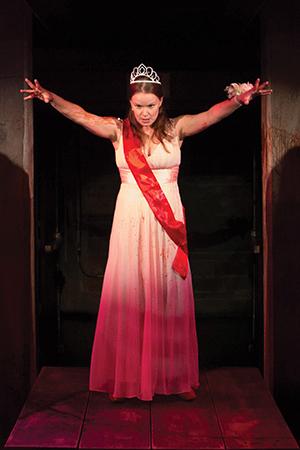‘Carrie: the Musical’ With Songs, Blood and Shock Enough
By • August 7, 2014 0 2538

“Carrie: The Musical,” now at the Studio Theater’s 2nd Stage, carries a lot of baggage.
Everyone remembers the source material. “Carrie” was one of horror novelist’s Stephen King’s first big successes in 1974, with its story of a high school girl who is an outcast, lives with a scary ultra-religious mother and has tele-kinetic powers. The 1976 movie version, directed by Brian de Palma and starring Cissy Spacek in the title role with Amy Irving and Piper Laurie, became a huge hit, resonant with teens and adults alike, and scary as all get out. There’s also a fairly recent but not so successful movie remake.
On top of that, there’s “Carrie: The Musical,” legendary in a not so good way, a production staged on Broadway in 1988 to the tune of around seven to eight million dollars in production costs, with a three-day run after some scathing reviews, making it the one of Broadway’s biggest flops ever.
But wait: Things aren’t so bad on 14th Street in D.C. after all. “Carrie: The Musical” isn’t “Carrie,” the movie, by any means, but it’s hardly flop-worthy in its Studio incarnation, directed by Keith Alan Baker and Jacob Janssen, and featuring a big-voiced, moving star turn by newcomer Emily Zickler as Carrie White.
The musical—described often somewhat mistakenly as a rock musical—remains the work of composer Michael Gore with lyrics by Dean Pitchford and a book by Lawrence D. Cohen, which hews fairly closely to the book, with some differences.
As a musical, “Carrie” is more of a pop-rock opera: there are 25 musical numbers performed by a fierce, high-energy cast, a mix of soaring, sometimes searing and soft ballads, jump up and down guitar-driven power numbers. The songs and the music aren’t necessarily memorable—there’s no “Wicked”-like “Gravity” number, for instance, but taken as a whole, they make their impression, carry the story along with energy and fit the material emotionally.
And it’s the whole that counts here, not so much individual incidents, although individual cast members Zickler, Barbara Walsh as her crazed, God-sick mom, Maria Rizzo as Sue, a sympathetic class mate, Robert Mueller as Tommy Ross, the likeable star jock who wants to be a writer, and Eben K. Loan as the hating, hateful high school mean queen Chris do stand out.
It’s still the same old story—Carrie, a 17-year-old misfit in high school and ignorant of sex and the world, discovers the onset of menstruation in a shower with her classmates, for which she is mercilessly bullied. She lives with her mother, who keeps her away from boys by locking her up in a closet and forces her to pray constantly.
Sue Snell, the school nice girl who’s dating Tommy, the star jock, takes pity on Carrie, and makes her try to fit in by making Tommy ask her to the prom. The result is all too familiar to most of us, even if the original novel is 40 years old.
It is the staging as much as anything that pulls you in here. It’s the intimate setting of the smallish fourth floor theater at the Studio, with the results that you’re always fairly close to the actions and the actors, who emote, dance group and re-group, and sing their hearts out within sometimes inches, and feet of the audience. And the directors and designer make do mostly with imagination—this is not a million-dollar set, but a door opening here, closing there, lights shifting the scenes and acting as a kind of malleable, moving set. There’s nothing fancy here, except the choreography of shifting the groups around the stage, until all of them become familiar. What’s special isn’t the blood and guts but the young characters on stage.
There are some effective, kinetic (no pun intended) moments here—“A Night We’ll Never Forget,” which opens the second act, is resonant of the cast preparing for the dance in “West Side Story,” Zickler displaying vocal and emotional range in Carrie’s plaintive “Why Not Me?,” the lovely “Unsuspecting Hearts” and “Once You See,” Walsh singing powerfully her own youthful memories in “I Remember How Those Boys Are.”
Because Zickler has made Carrie so appealing with her uncertainty, her yearning to be normal, her painfully shy stance with Billy, the story moving at a train-wreck speed, makes you afraid for her, it fills you with dread, but also expectations. How will they stage her ragingly destructive power, how will the ultimate bad trick of the bucket of blood work out?
Well, it’s not the movie, but it still has the power to shock. Wisely, I think, the production lays off high-tech spectacle. Carrie’s power may be horrific and weird, but it’s the deed that counts.
The musical-opera has a lot of punch, surprisingly so, given the reputation of the original production. There’s a lot of talent on display here, fresh, volatile. It’s a full-throttle reminder that life can still be like high school. It’s not rock and roll, but I like it.
- Emily Zickler as Carrie White in Studio 2ndStage’s Carrie: The Musical. | Igor Dmitry
- Garrett Faulkner



